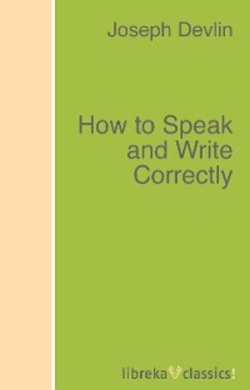Читать книгу How to Speak and Write Correctly - Joseph Devlin - Страница 7
THE ENGLISH LANGUAGE IN A NUTSHELL
ОглавлениеAll the words in the English language are divided into nine great classes. These classes are called the Parts of Speech. They are Article, Noun, Adjective, Pronoun, Verb, Adverb, Preposition, Conjunction and Interjection. Of these, the Noun is the most important, as all the others are more or less dependent upon it. A Noun signifies the name of any person, place or thing, in fact, anything of which we can have either thought or idea. There are two kinds of Nouns, Proper and Common. Common Nouns are names which belong in common to a race or class, as man, city. Proper Nouns distinguish individual members of a race or class as John, Philadelphia. In the former case man is a name which belongs in common to the whole race of mankind, and city is also a name which is common to all large centres of population, but John signifies a particular individual of the race, while Philadelphia denotes a particular one from among the cities of the world.
Nouns are varied by Person, Number, Gender, and Case. Person is that relation existing between the speaker, those addressed and the subject under consideration, whether by discourse or correspondence. The Persons are First, Second and Third and they represent respectively the speaker, the person addressed and the person or thing mentioned or under consideration.
Number is the distinction of one from more than one. There are two numbers, singular and plural; the singular denotes one, the plural two or more. The plural is generally formed from the singular by the addition of s or es.
Gender has the same relation to nouns that sex has to individuals, but while there are only two sexes, there are four genders, viz., masculine, feminine, neuter and common. The masculine gender denotes all those of the male kind, the feminine gender all those of the female kind, the neuter gender denotes inanimate things or whatever is without life, and common gender is applied to animate beings, the sex of which for the time being is indeterminable, such as fish, mouse, bird, etc. Sometimes things which are without life as we conceive it and which, properly speaking, belong to the neuter gender, are, by a figure of speech called Personification, changed into either the masculine or feminine gender, as, for instance, we say of the sun, He is rising; of the moon, She is setting.
Case is the relation one noun bears to another or to a verb or to a preposition. There are three cases, the Nominative, the Possessive and the Objective. The nominative is the subject of which we are speaking or the agent which directs the action of the verb; the possessive case denotes possession, while the objective indicates the person or thing which is affected by the action of the verb.
An Article is a word placed before a noun to show whether the latter is used in a particular or general sense. There are but two articles, a or an and the.
An Adjective is a word which qualifies a noun, that is, which shows some distinguishing mark or characteristic belonging to the noun.
